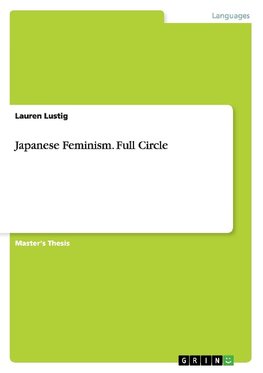
-
 Anglický jazyk
Anglický jazyk
Japanese Feminism. Full Circle
Autor: Lauren Lustig
Master's Thesis from the year 1999 in the subject Orientalism / Sinology - Japanology, The George Washington University, language: English, abstract: By analyzing literature that has been produced on Japanese feminism and by Japanese feminists in the last... Viac o knihe
Na objednávku
16.65 €
bežná cena: 18.50 €
O knihe
Master's Thesis from the year 1999 in the subject Orientalism / Sinology - Japanology, The George Washington University, language: English, abstract: By analyzing literature that has been produced on Japanese feminism and by Japanese feminists in the last century, this paper attempts to provide an overarching framework through which to view the flow of Japanese feminist consciousness from the Meiji period to its current status. Viewing this brief history of feminism will perhaps enable us to come to a better understanding of the factors that keep Japanese women from reaching gender equality. As I mentioned earlier, the main premise of the paper is that the focus of the feminist movement in Japan has traveled full circle, from and to an emphasis on expanding and raising women's consciousness. Within this premise are two important factors: The first being that feminist consciousness has been inhibited by a series of somewhat unique historical and contextual variables from "inside" and "outside" of the Japanese women's movement. The second concept is that, although Japanese feminist consciousness has been stunted, there is indication today that the Japanese women's movement has finally come of age; feminist leaders in Japan have fully targeted the main barriers to equality, developed and evolved theories as to why these barriers exist and are currently implementing special programs, such as the women study-related courses on university campuses, and the Gender Equality by 2000 program, to release the blocked flow of feminist consciousness. I'm sure there are also other, informal and formal programs going on that are beyond an outsider's eyesight, and beyond the limited scope of this brief overall analysis.
The paper is divided into seven main sections. First, there are two sections in which I attempt to delineate the particular meaning of "Japanese feminism." Following is a brief discussion of the historical and cultural factors that have inhibited the flow of Japanese consciousness. In the latter sections, I take a look at the historical progression of Japanese feminist consciousness vis a vis certain women groups that have formed, and actions that have gained media attention throughout the last century. Although a thin thread of feminism is seen decade to decade in the formation of the concepts "new women," "modan gaaru," "uman riba" and "feministo," there are obviously a lot of factors that point to a certain flagging of feminist consciousness and a lack of focus to the women's movement throughout the century.
- Vydavateľstvo: GRIN Verlag
- Rok vydania: 2014
- Formát: Paperback
- Rozmer: 210 x 148 mm
- Jazyk: Anglický jazyk
- ISBN: 9783656758334




 Nemecký jazyk
Nemecký jazyk 
 Ruský jazyk
Ruský jazyk 




